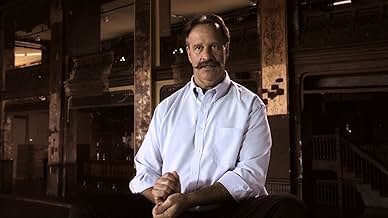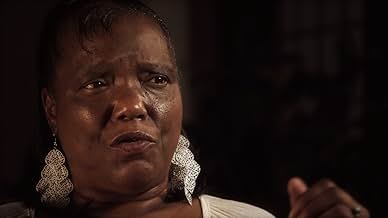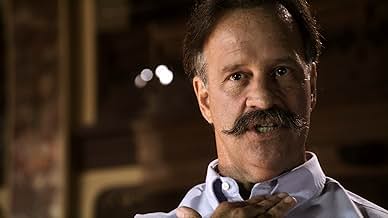CALIFICACIÓN DE IMDb
6.3/10
2.2 k
TU CALIFICACIÓN
Agrega una trama en tu idiomaAn experimental documentary that uses archival footage, interviews, and fictionalized scenarios to tell the story of the people around Jeffrey Dahmer, during the summer of his arrest in 1991... Leer todoAn experimental documentary that uses archival footage, interviews, and fictionalized scenarios to tell the story of the people around Jeffrey Dahmer, during the summer of his arrest in 1991.An experimental documentary that uses archival footage, interviews, and fictionalized scenarios to tell the story of the people around Jeffrey Dahmer, during the summer of his arrest in 1991.
- Dirección
- Guionistas
- Elenco
- Premios
- 1 premio ganado y 2 nominaciones en total
Jeffrey Dahmer
- Self
- (material de archivo)
- Dirección
- Guionistas
- Todo el elenco y el equipo
- Producción, taquilla y más en IMDbPro
Opiniones destacadas
Chris James Thompson's Jeff, a docudrama involving the interworkings of the Jeffrey Dahmer case, opens by establishing two different, vital points for a film like this to make. It has the medical examiner, Jeffrey Jentzen, assigned to the case of Jeffrey Dahmer state how many people have formulated different meanings behind what exactly a "disaster" is, and then has leading detective on the case, Patrick Kennedy, go into how as human beings we'd love to believe we'd react courageously in the face of tragedy or despair, but we can never be certain until it happens. He then goes on to state how as a devout Catholic, he was always thought that courage is fear that said its prayers.
All I can say is that fear can pray all it wants, but it could never have prepared itself for the horror Dahmer inflicted not only on a community but on a country as a whole. Jeff dives into three people, all of them deeply effected by Dahmer's actions in some way, and spliced in are scenes recreated to show Dahmer's day-to-day life, as mundane as it is, with the man in question played wonderfully by Andrew Swant. The three people, however, are not actors, and are here to share their depressingly grim accounts of their relationship with Dahmer. The medical examiner is Jeffrey Jentzen and the leading detective is Patrick Kennedy, as established, and but the third person was the most personally affiliated with the man and that is Pamela Bass, who was the next door neighbor to Dahmer in his apartment for many years.
The film explores how deeply this one unexplainable murder case completely changed the lives of three normal, innocent, law-abiding people and how they've gone on to better or further their lives based on this case alone. Pat Kennedy, easily the one with the biggest story to tell due to his explicit connection with Dahmer during the time of his arrest, conviction, and jail-life, goes into how when he first met the man, they talked in lengthy detail about religion and alcoholism. This was during the time that a skeleton was found in his refrigerator, so says Kennedy, who recalls his thoughts and mindset as he discovers there was not just one but six skulls found in Dahmer's refrigerator, among other severed body parts in containers, drums, and jars that lied throughout the home of Dahmer.
This is one of the most unique documentary films I've ever seen, with a style very similar to that of Richard Linklater's Bernie, which featured polarizing performances by Jack Black, Matthew McConaughey, and Shirley McClaine. It takes the same kind of mockumentary approach that film did, featuring reenactments and authentic interviews from various townspeople who knew the suspect in question. However, this film has less of a mock-narrative consistency than Bernie, with the scenes featuring Dahmer involving little dialog and emphasizing on the mundane activities of the man behind washed-out cinematography and often low-key music. This is the stylistic side of the picture, which is very innocent and unobtrusive to its central focus. Next to Quentin Dipeux's Wrong, this is easily some of the best cinematography and stylistic merits a film has had this year, only this time, the traits are embodied in a film that is much more watchable and clear in its tone.
Jentzen goes into the grim details of investigating and gutting the apartment, and being put to the painstaking task of identifying all the bodies removed from the apartment. It was a tireless project, seeing as how not only were the bodies dismembered and mutilated, but they had begun decomposing, leaving much of the reliance on small facial details and anatomy structure to identify them. Finally, Bass goes into how she was effected simply for being her neighbor. The apartments and their always reeked of death for weeks on end, and she and her building were the target of public scrutiny and attention, with numerous people asking if they could come in to sit on couch Dahmer gave her or touch a glass Dahmer once drank out. We begin to question that, besides Dahmer, who else was sick in this whole equation.
There is no better way to describe Jeff than a complete film than a subtle and low-key crime drama. Everything about it is an exercise is subtle, minimalist filmmaking that accentuates drama, uncertainty, and impending doom with true craft, from a filmmaker who clearly has a long road to travel on before he can even give us, what I believe, is half of what he wants to say. If there's any film that should be shown to film students as a look at what a first-time auteur looks like, this is it.
One of the best and most thought-provoking scenes is the scene where Jentzen reveals that he doesn't go to horror movies and can't see why people would want to. The last horror film he saw was The Exorcist, likely in its original theatrical run in 1973. He doesn't feel the need to watch anymore. Why would he? He lived a horror film and there's no "stop" button on his.
Starring: Andrew Swant, Pamela Bass, Jeffrey Jentzen, and Pat Kennedy. Directed by: Chris James Thompson.
All I can say is that fear can pray all it wants, but it could never have prepared itself for the horror Dahmer inflicted not only on a community but on a country as a whole. Jeff dives into three people, all of them deeply effected by Dahmer's actions in some way, and spliced in are scenes recreated to show Dahmer's day-to-day life, as mundane as it is, with the man in question played wonderfully by Andrew Swant. The three people, however, are not actors, and are here to share their depressingly grim accounts of their relationship with Dahmer. The medical examiner is Jeffrey Jentzen and the leading detective is Patrick Kennedy, as established, and but the third person was the most personally affiliated with the man and that is Pamela Bass, who was the next door neighbor to Dahmer in his apartment for many years.
The film explores how deeply this one unexplainable murder case completely changed the lives of three normal, innocent, law-abiding people and how they've gone on to better or further their lives based on this case alone. Pat Kennedy, easily the one with the biggest story to tell due to his explicit connection with Dahmer during the time of his arrest, conviction, and jail-life, goes into how when he first met the man, they talked in lengthy detail about religion and alcoholism. This was during the time that a skeleton was found in his refrigerator, so says Kennedy, who recalls his thoughts and mindset as he discovers there was not just one but six skulls found in Dahmer's refrigerator, among other severed body parts in containers, drums, and jars that lied throughout the home of Dahmer.
This is one of the most unique documentary films I've ever seen, with a style very similar to that of Richard Linklater's Bernie, which featured polarizing performances by Jack Black, Matthew McConaughey, and Shirley McClaine. It takes the same kind of mockumentary approach that film did, featuring reenactments and authentic interviews from various townspeople who knew the suspect in question. However, this film has less of a mock-narrative consistency than Bernie, with the scenes featuring Dahmer involving little dialog and emphasizing on the mundane activities of the man behind washed-out cinematography and often low-key music. This is the stylistic side of the picture, which is very innocent and unobtrusive to its central focus. Next to Quentin Dipeux's Wrong, this is easily some of the best cinematography and stylistic merits a film has had this year, only this time, the traits are embodied in a film that is much more watchable and clear in its tone.
Jentzen goes into the grim details of investigating and gutting the apartment, and being put to the painstaking task of identifying all the bodies removed from the apartment. It was a tireless project, seeing as how not only were the bodies dismembered and mutilated, but they had begun decomposing, leaving much of the reliance on small facial details and anatomy structure to identify them. Finally, Bass goes into how she was effected simply for being her neighbor. The apartments and their always reeked of death for weeks on end, and she and her building were the target of public scrutiny and attention, with numerous people asking if they could come in to sit on couch Dahmer gave her or touch a glass Dahmer once drank out. We begin to question that, besides Dahmer, who else was sick in this whole equation.
There is no better way to describe Jeff than a complete film than a subtle and low-key crime drama. Everything about it is an exercise is subtle, minimalist filmmaking that accentuates drama, uncertainty, and impending doom with true craft, from a filmmaker who clearly has a long road to travel on before he can even give us, what I believe, is half of what he wants to say. If there's any film that should be shown to film students as a look at what a first-time auteur looks like, this is it.
One of the best and most thought-provoking scenes is the scene where Jentzen reveals that he doesn't go to horror movies and can't see why people would want to. The last horror film he saw was The Exorcist, likely in its original theatrical run in 1973. He doesn't feel the need to watch anymore. Why would he? He lived a horror film and there's no "stop" button on his.
Starring: Andrew Swant, Pamela Bass, Jeffrey Jentzen, and Pat Kennedy. Directed by: Chris James Thompson.
THE JEFFERY DAHMER FILES (dir. Chris James Thompson) A startlingly original dramatization and documentary about infamous Milwaukee serial killer, Jeffery Dahmer. The film features conversations with three interviewees; the detective who had first contact with Dahmer, the middle- aged, Afro American woman who was Dahmer's neighbor in the apartment building where his crimes were committed, and the medical examiner on the case. The fictionalized sections of the film augment and enhance the interrogative segments, and make this an authentic dramatic production and not just a series of interviews with 'talking heads'. The film is not even eighty minutes, but it is superbly edited and a brilliant example of documentary film-making. Well Worth a Look.
Everyone knows it was APT 213, but they had it as 214 in these really bad dramatizations/recreations that are cut in between interviews which makes for a bad format. It would be better just with the interviews.
Experimental Jeffrey Dahmer documentary which actually focuses more on the Milwaukeeans during and after his hidden spree. The reenactments are beautifully shot; and Andrew Swant (also the film's co-writer) slides into the monster's skin so smoothly, ultimately humanizing Dahmer without becoming charming or remotely likable. Unfortunately, the three interviewees are not overly appealing, and you can't help but remember that there are many more interesting people who had a thing or two to say about Dahmer. Archival footage included, but is used somewhat minimally. Originally premiered simply as JEFF and was later changed to THE JEFFREY DAHMER FILES when picked up by IFC.
**½ (out of four)
**½ (out of four)
An experimental documentary film that uses archival footage, interviews, and fictionalized scenarios to tell the story of the people around Jeffrey Dahmer during the summer of his arrest in 1991.
I like how they emphasized that Dahmer was a white guy in the black neighborhood, an wish this could have been explored more. Those not familiar with Milwaukee may not realize how incredibly segregated it is.
I further appreciated the story of the shirt, and plenty of other behind the scenes details from Detective Pat. Some may find it boring, but I think the idea of Pat just talking for two hours would be fascinating. He probably has other non-Dahmer stories to tell.
Using an actor to portray Dahmer was interesting. At first it seemed silly and unnecessary, but I understand why they went with it -- if you do not have the footage, you have to fill the screen with something.
I like how they emphasized that Dahmer was a white guy in the black neighborhood, an wish this could have been explored more. Those not familiar with Milwaukee may not realize how incredibly segregated it is.
I further appreciated the story of the shirt, and plenty of other behind the scenes details from Detective Pat. Some may find it boring, but I think the idea of Pat just talking for two hours would be fascinating. He probably has other non-Dahmer stories to tell.
Using an actor to portray Dahmer was interesting. At first it seemed silly and unnecessary, but I understand why they went with it -- if you do not have the footage, you have to fill the screen with something.
¿Sabías que…?
- TriviaWon the Milwaukee Film Festival's Cream City Cinema Grand Jury Award for 2012.
- ErroresWhen Dahmer is purchasing alcohol in the convenient store, the "WE CARD" sticker on the freezer to the right says the "born on this date" year to purchase alcohol is 1990.
- Bandas sonorasStill Light
Performed by The Knife
Selecciones populares
Inicia sesión para calificar y agrega a la lista de videos para obtener recomendaciones personalizadas
- How long is The Jeffrey Dahmer Files?Con tecnología de Alexa
Detalles
Contribuir a esta página
Sugiere una edición o agrega el contenido que falta

Principales brechas de datos
By what name was The Jeffrey Dahmer Files (2012) officially released in Canada in English?
Responda

























